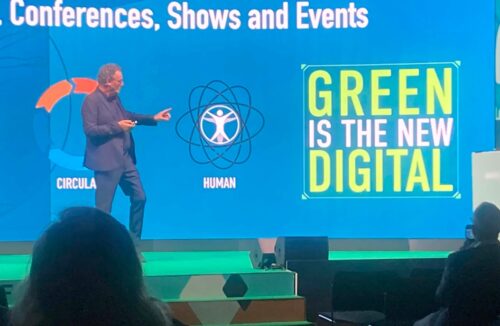The choice of Vienna for the Professional Convention Meeting Association (PCMA) Convening EMEA event in early autumn this year could not have been better timed. Not only has the Austrian capital been placed at first place in this year’s ICCA rankings as best meetings destination, it was also named the ‘most lively city in the world’ in the Economic Global Liveability Index. In his opening speech, Christian Woronka, director of the Vienna Convention Bureau (VCB) said, “Vienna is one of the most liberal cities in the world. Diversity connects with PCMA’s vision on diversity and inclusion as well.”
The collaboration between the VCB and the PCMA was enriching for both parties, setting the stage for a successful convention. “We started as business partners,” said Ulrike von Arnold, deputy director of the VCB, “then moved to be friends. Now it feels like being family.”
With over 400 attendees from 42 different countries, gathered in one of Europe’s most prestigious capitals, the convention was certainly a success for PCMA -EMEA Regional Director Jaimé Bennett.
Under the convention heading ‘Together we move forward’ there were several keywords: Future – examining how new trends impact organisations and what measures can be taken to embrace and mitigate these changes; Engagement – being aware of internal and external stakeholder’s changing behaviours and exploring how to incorporate them and make them relevant to the overall strategy; Planning – looking at how the industry can learn to develop solution-focused insights and use them to guide future activity.
Gerd Leonhard from Switzerland was the keynote speaker. He underlined the importance of planning with his theme ‘The next 10 years’, which he was careful to point out wasn’t intended as a prediction, but rather as a way to help to envisage a possible future. He also argued that technology will never overtake or be a substitute for human experience, positing that we will enter a “new human renaissance”, in which live sensory experience will play an integral role. “We have to re-humanise our conventions,” he said, while also underlining the need for the industry to focus on sustainability.
Needs assessment
The discussion on ‘Audience Needs & Behaviours’ was led by Visit Scotland’s senior Business Events manager, Rory G. Archibald, and included panellists Tom Reiser of the ISTH (International Society on Thrombosis and Haemostasis), Daniel Waig of CIRSE (Cardiovascular and Interventional Radiological Society), and Giulia Sarri, Creative Strategist with AIM International
In summary, the findings of the speakers centred around getting to know your audience better by analysing data gathered through hybrid events and surveys. This needs-assessment can prove useful in determining how future events can be organised and structured in a way that delivers value to the relevant stakeholders.
On a concrete level, that might translate into adopting a marketing approach to designing meetings and conventions, for example by identifying traits that would allow the organiser to cluster people into 4 or 5 broad categories, according to their specific needs, and creating specifically targeted events for each cluster, rather than holding one broad event. The skills involved in establishing these types of cluster profiling are usually beyond the scope of most organizations and generally require the intervention or assistance of an external professional agency.
The ISTH suggested a more cautious gradual approach, rather than a revolutionary reworking of strategies, in order to achieve the desired results.
The CIRSE came to the conclusion engagement was more effective by being active the whole year around, with both in-person and hybrid channels optimised. It also pointed out that their past experience had led them to favour faculty members being live during hybrid meetings, rather than participating remotely from their homes.
AIM underlined the importance of maintaining a spirit of curiosity and inquiry by always asking ‘Why?’

The IBM example
The findings of this association-oriented session were validated during the presentation given by Corporate IBM Events Director, Colleen Bisconti, who gave her view on the most prominent trends in the business events industry. Sharing her insights, she pointed out that: event attendees are increasingly subject to time constraints; storytelling and AI are becoming the trend; analysis is needed in order to understand and establish the different priorities for in-person events and digital events.
To illustrate her point, Bisconti gave the example of the big IBM global event: THINK. For years 40.000 attendees gathered together in one place for this annual event.
Recently, IBM decided to ‘Go to the customer’. This resulted in 17 different events being held in 17 different cities across the globe, followed by a digital news programme event which hosted 80,000 digital attendees. According to Mrs Bisconti the trend is set for the future, driven by attendees’ needs, but also by the financial impact, establishing a structure of an event held in a regional city, still quite large in scale, but smaller than previous global events, followed by digital actions.
This change has an impact on the choice of venues, on the organisation of regional roadshows, and creating regional experiences in areas where the attendees live. In short, the goal is to create unified yet modular and scalable experiences, with a focus on content evolution in data-driven events that incorporate storytelling, co-creation, and sustainability.
Bisconti made clear that making such changes wouldn’t necessarily an easy task, illustrating this by choosing a quote from IBM’s former CEO, Ginny Rommety, as her final slide: “Growth and comfort never co-exist.”
Echoing a similar sentiment, Sherrif Karamat, president and CEO of PCMA, said in his ending note, that the mission of the PCMA -EMEA was to deliver new values in an ever-changing world, and that it is time for a change in our mindsets too, inciting attendees “not to endure but to act.”
The next PCMA Convening EMEA will take place on 20-22 September 2023 in the Bella Centre Copenhagen.
